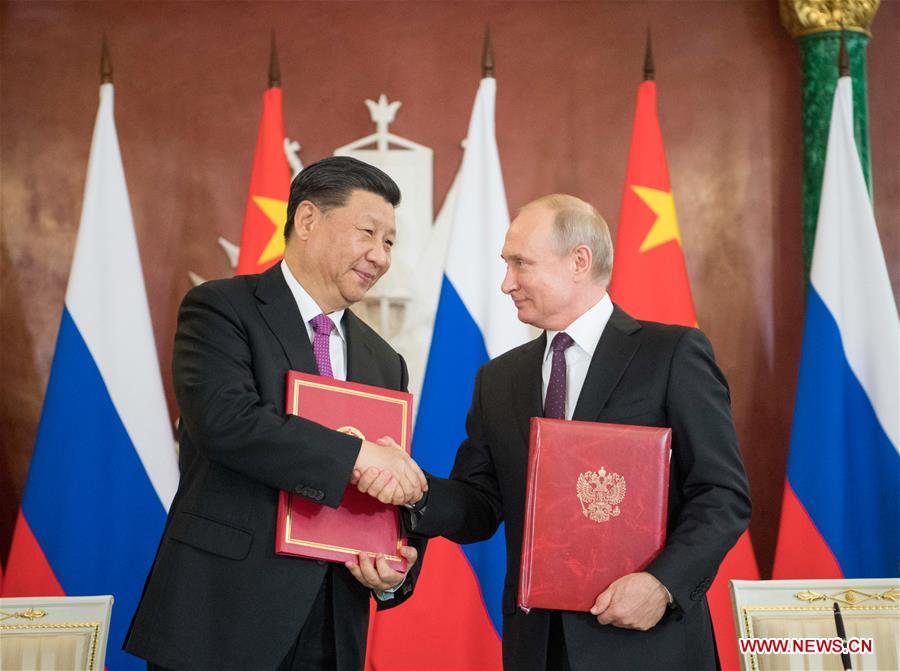A new milestone in China-Russia relations
 0 Comment(s)
0 Comment(s) Print
Print E-mail Xinhua, June 8, 2019
E-mail Xinhua, June 8, 2019

With a burst of applause at the fully-packed Malachite Room of the Kremlin, visiting Chinese President Xi Jinping and his Russian counterpart, Vladimir Putin, signed a joint statement in person on elevating bilateral ties to a comprehensive strategic partnership of coordination for a new era.
The document was signed Wednesday after a meeting between the two heads of state during Xi's visit to Russia at a time when the two countries are celebrating the 70th anniversary of their diplomatic ties.
Observers believe that the upgrading of China-Russia relations heralds not only more win-win cooperation between the two giant neighbors but also more contributions to global development and stability.
CONVERGENCE OF INTERESTS
The joint statement said that the goal of such a new kind of partnership is for both sides to give more support to each other as they pursue their own development paths, preserve respective core interests, and protect sovereignty and territorial integrity.
Therefore, said the statement, the two sides will closely coordinate with each other in aligning their development strategies, expand mutually beneficial cooperation in trade and investment, and further expand bilateral ties overall.
China is ready to work with Russia to foster stronger synergy between the Belt and Road Initiative (BRI) and the Eurasian Economic Union (EAEU), said Xi in an interview with TASS Russian News Agency and Rossiyskaya Gazeta newspaper on Tuesday.
He suggested that the two countries jointly advance negotiations on a Eurasian economic partnership agreement, enhance facilitation of regional trade and investment, and make greater contributions to their respective development and rejuvenation as well as regional prosperity and stability.
In 2018, two-way trade between China and Russia hit a record high of over 100 billion U.S. dollars. Major cooperation projects have been steadily carried out in such areas as energy, transportation, agriculture, aviation and space.
Russian Industry and Trade Minister Denis Manturov said one of the most important tasks for Russia and China is to increase the stability of their trade and economic relations in face of unfavorable external factors, including volatility of the global market and rising protectionism.
SOLID FRIENDSHIP
With the China-Russian relationship entering a new era, two furry ambassadors are adding a fresh liveliness to the old China-Russia friendship.
A pair of giant pandas, three-year-old male Ru Yi and two-year-old female Ding Ding, arrived in Moscow in late April from China's southwestern province of Sichuan.
They were formally handed over to Russia for a 15-year joint research program on Wednesday at an opening ceremony for the panda house at Moscow Zoo, which was attended by Xi and Putin.
"I think it's a very good sign of friendship, because animals are always associated with friendship, kindness and openness," said a zoo visitor from St. Petersburg who called herself Osipova.
The panda program illustrates the growing exchanges between the two countries in such areas as science and technology, culture, tourism and education.
Russian Minister of Science and Higher Education Mikhail Kotyukov said Russian universities are ready to cooperate with their Chinese partners on scientific research and education.
Currently, about 30,000 Chinese students study in Russian universities, while in Chinese universities there are about 20,000 Russian students, according to the minister.
"In 2019, for the first time, Russian schoolchildren can choose Chinese for the Unified State Exam. We know about the growing interest of Russian schoolchildren and students in learning Chinese," Kotyukov said.
GLOBAL STABILITY
Through deepening bilateral cooperation and people-to-people exchanges, China and Russia are joining hands to better tackle global challenges.
In another joint statement signed by the two heads of state, the two countries vowed to strengthen global stability.
Recognizing that international security is now facing serious challenges, China and Russia intend to deepen trust and coordination to firmly safeguard global and regional stability, according to the joint statement.
Yuri Tavrovsky, a professor with the People's Friendship University of Russia, said developments in global affairs will depend on how Russia and China interact.
In this new era of bilateral ties, Russia and China can coordinate more closely with each other on international issues and in international organizations, Tavrovsky said.
"Our countries currently interact very well in the international arena. But we must respond more effectively to hegemony and unilateralism," he said.






Go to Forum >>0 Comment(s)